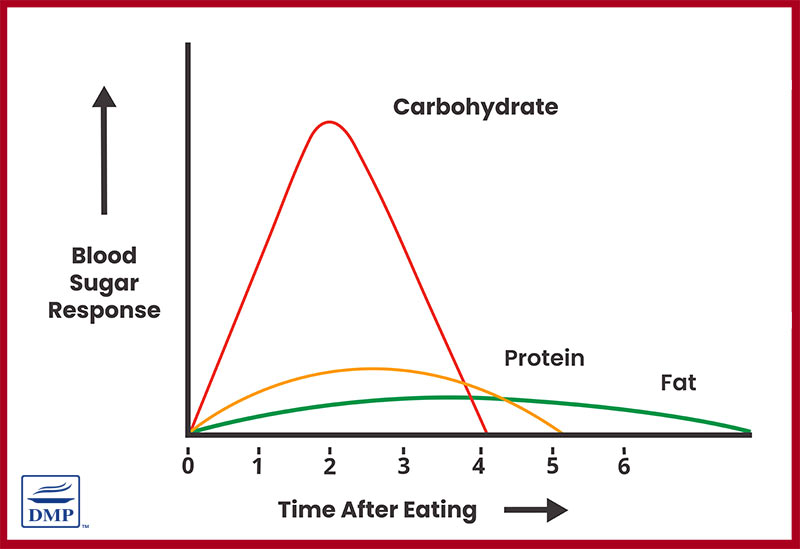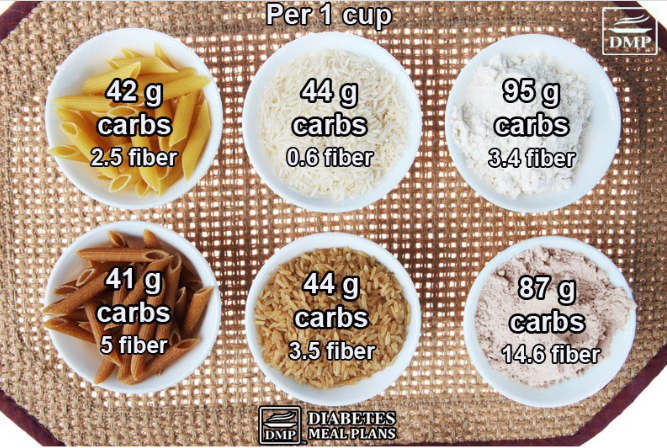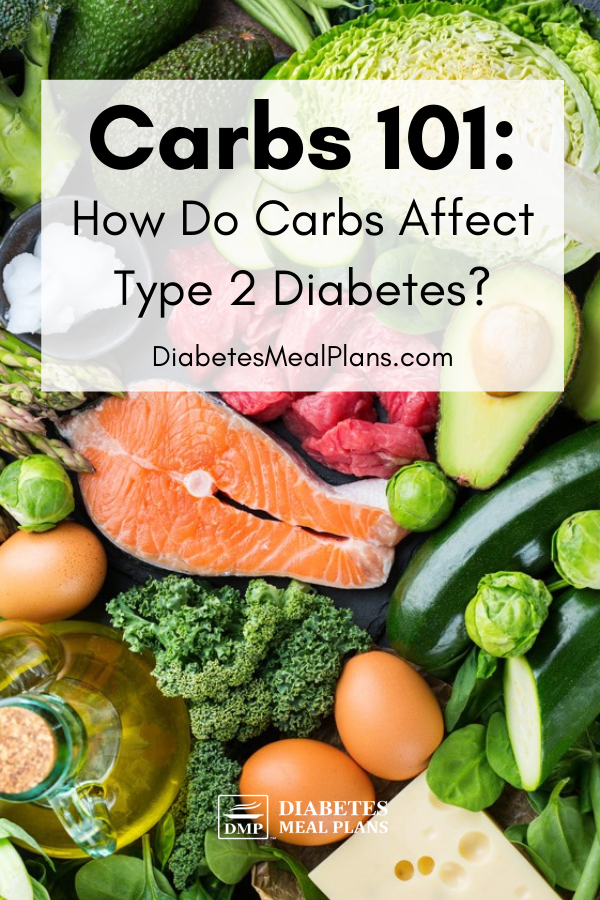As a person with type 2 diabetes one of the first nutrients you become aware of are carbs. There is a good reason for that and it all has to do with your blood sugar and A1c levels.
We recently ran a mini carb class, so feel free to watch the replay below or read on to learn more about why carbohydrates are an important nutrient to know more about.
Learn more about our weekly plans and nutrition service >
Why Choosing the Right Carbs is so Important
Carbohydrates, protein, and fat are the 3 different macronutrients you will encounter, but carbs get the spotlight when we’re discussing diabetes. This is for one simple reason: carbs have the greatest influence on your blood sugar levels.
You can see the wildly different effect that carbs, protein, and fat have on your blood sugar levels by looking at the chart below.

The carbs cause a massive rise in blood sugar levels and then a steep drop-off within two hours after consuming them. Compare this to the trajectory of the protein and fat. These two macronutrients are preferred over carbs because they provide stable blood sugar levels for many hours after eating.
Another side effect of eating too many carbs when you already have diabetes is that you will likely experience higher-than-average blood sugar levels, which of course is not ideal. Chronic elevated blood sugar levels (represented by a high A1c number) can put you at greater risk for diabetes complications like kidney disease, eye problems, and nerve pain.
Breaking away from a high-carb diet can be a real challenge at first, but it’s so worth it!
What Are Carbs?
When you hear the phrases “cutting carbs,” or a “low carb diet” you probably think of limiting foods like doughnuts, pizza, cookies, and soda. While these things certainly are high carb (and highly processed), there are other carbs out there besides junk foods.
Sugar is a carb, but so are legumes, beans, pastas, breads, rice, and oats, as well as fruits and vegetables.
Yes, even vegetables have carbohydrates! In fact, most foods (except animal products like meat and eggs) contain carbs.
With type 2 diabetes, the best course of action for better blood sugar control is choosing foods that are lower in carbs.
Vegetables are a vital part of a healthy diet due to their fiber, vitamin, and mineral content, even though they fall under the “carb” umbrella. While sugar and starchy foods are types of carbs that are best avoided or minimised.
How Many Carbs Per Day?
A typical Western diet consists of about 60% of energy (calories) coming from carbs – up to 300 grams of carbs every day.
In our experience, consuming this many carbs makes it extremely difficult to gain good blood sugar control.
As a contrast, we encourage people to aim for 50-120g of carbs per day, which is about 10-25% of your daily energy needs.

These numbers can be difficult to conceptualize if you’re not used to thinking in terms of grams and percentages, so let’s take a look at how 50-100g of carbs breaks down over the course of a day. We’ve got two examples here, one with a goal of 100 grams of carbs per day, and one with a goal of 50 grams (both are good goals).
50g Carbs Per Day:
100g Carbs Per Day:
- Breakfast: 25 g
- Lunch: 25 g
- Dinner: 25 g
- 2-3 Snacks: 10 g carbs each
Carbs to Avoid
The obvious “carb culprits” are flour-based or sugar-based products like traditional pastas, rice, cereals, and bread, as well as sugar-sweetened beverages, candies, and desserts.
This also extends to starchy veggies like potatoes and all things potato-based (but don’t worry, we have plenty of tasty potato alternative recipes for you to try out!).
Check out this graphic below to see why foods like pasta and breads made from flour are some of the top-tier offenders. Just a small amount of pasta, rice, or flour makes the carbs really stack up!

Beyond these high carb foods, we also encourage you to take it easy on the processed and packaged foods. These tend to be high in added sugars and salt, as well as processed vegetable oils (that can be inflammatory) and dyes, artificial flavors, and all kinds of other junk that isn’t doing your body any favors.
The fresher the food you eat, the better you’ll feel!

Best Carbs to Eat
Now for the fun part…what carbs can you actually eat?
The best kinds of carbs actually come from vegetables. Whether steamed, grilled, or eaten fresh, non-starchy veggies are the best bang-for-your-buck when it comes to carbohydrates. The amount of carbs in most veggies is negligible compared to all the fiber, vitamins, and other anti-inflammatory nutrients you’re getting.
Your diet should be rich in veggies, enjoyed in a variety of ways.
The second best source of carbs would be low carb fruits like berries and citrus fruits.
Just remember to keep the berries to a small serving (1/2 cup) in order to reap the benefits without sending your blood sugar overboard. You can also enjoy a small fruit such as a kiwi or a plum from time to time, just be sure to keep an eye on those serving sizes.
High Carb Foods vs Low Carb Alternatives
If you’re a major carb-lover, then what you’ve just read may leave you feeling down, but don’t worry! There are so many ways to get creative with lower carb foods to mimic the taste and texture of higher carb ones.
For example, a cup of regular mashed potatoes contains about 40g of carbs, but a cup on mashed cauliflower “potatoes” only has 10g. Cauliflower is a great alternative veggie because it can taste similar to starchy foods like potatoes and rice.
Low carb alternatives to rice such as cauliflower, konjac, or cabbage “rice” taste just as amazing but without all those pesky carbs.
Almost anything you love can be recreated in a low carb recipe: low carb pizza, pasta, breads, desserts, and more!
Conclusion
Hopefully, you now have a better grasp on why carbs are such a big deal, how they influence blood sugar, and what foods are best to eat and avoid.
Remember that every journey starts with a single step. You’ve already taken the first step by educating yourself so you can better your health. Now, take the next step and put that knowledge into practice!
And if you don’t know where to start or you need low carb recipe inspiration, feel free to check out our weekly meal plans!

Beth
I’m really enjoying this service and I plan to renew when the time comes. What I would like to understand is will my meal plans etc continue to be available as long as I continue to renew or do I need to do something special to save them in the system. Thanks!
Jedha: Nutritionist (MNutr)
Hi Beth, as long as you maintain an active subscription you will be able to access the members site. If your membership expires you will no longer have access. Hope that helps :)
Oliver
Many thanks for your recent meal plan pyramid, so far i have benefited. I have been eating bread that mark 100% whole weat toasted,is that ok?
Jedha: Nutritionist (MNutr)
We encourage people to minimise or eliminate all grains as they are high in carbs, whole wheat or not.